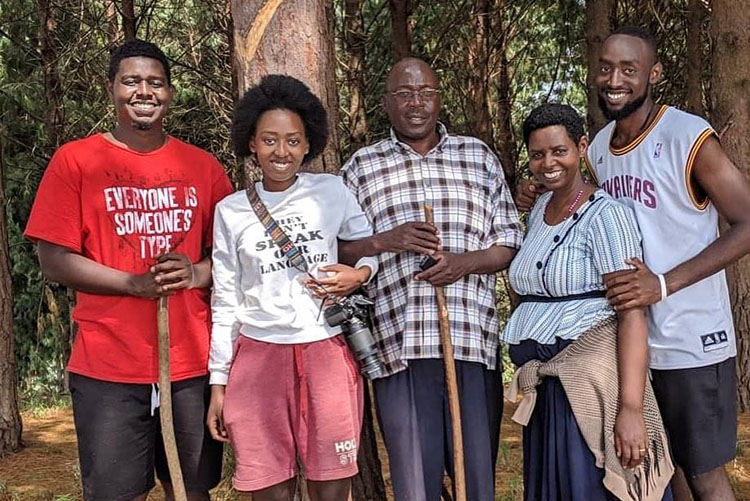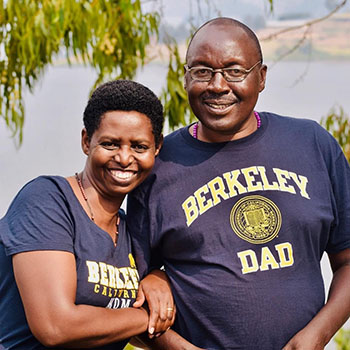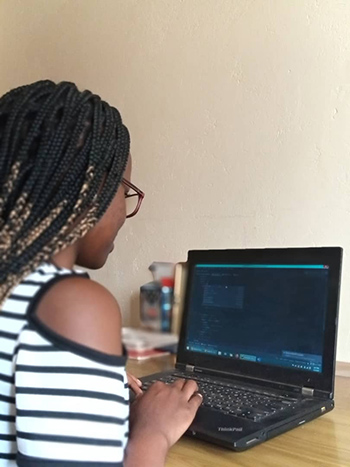COVID Stories: The chance to teach young Ugandan women to code
February 2, 2021

UC Berkeley graduate student Gloria Tumushabe, a Mastercard Foundation Scholar from Uganda, is teaching 13 young women in Uganda how to code during the coronavirus pandemic, when many of the country’s schools are closed and remote learning is scarce. (Photo by Alex Mutwiri)
The COVID-19 pandemic has separated us, but sharing stories about how members of the campus community have been surviving — and even thriving — since last spring can help draw us together. Berkeley News is gathering inspiring personal tales of heartache and triumph related to the coronavirus and will run them periodically in the coming weeks. If you’d like to pitch us your story, send a brief email to [email protected].
This is the third story in the series. It highlights Gloria Tumushabe, a Mastercard Foundation Scholar in the Department of Electrical Engineering and Computer Sciences.
As a young girl, Gloria Tumushabe, a UC Berkeley graduate student born and raised in Uganda, always ranked at the top of her primary school classes. Her parents saw her talent and would say, “You’re always winning the boys in class. You can be anything!”
And, like many African parents, she said, they’d add, “The smartest people are engineers. You should be an engineer.”

Gloria Tumushabe’s family in Uganda: From left, her brother, Martin Mubangizi; sister, Sylvia Ayebare; father, Sylvester Ekyomukamarimpa; mother, Mujawimaana Luce; and brother, Marvin Tumusiime. (Photo courtesy of family of Gloria Tumushabe)
In high school, she focused on preparing to be an engineer, and after graduating as valedictorian, she headed to the U.S. for college, as a Mastercard Foundation Scholar at Berkeley.
“You can become a better engineer at one of those top institutions,” her father said. He and Tumushabe’s mother both are accountants; her father now has retired.
But in the back of her mind, Tumushabe, who was an electrical engineering and computer sciences major as an undergraduate and will receive a master’s degree in computer science this May, said she has long had an additional aspiration: “I want to teach. I love teaching, explaining things to people.”
When the coronavirus pandemic hit in early 2020, she got her chance. Tumushabe, sheltered in place in Walnut Creek, decided to remotely start teaching girls in Uganda how to code, a skill that allows you to create computer software, apps and websites.
It was a dream she’d harbored since 2017, while doing an internship in Kampala, Uganda’s capital city, after her freshman year at Berkeley. “It was the very first time I’d been to Uganda after coming to Berkeley, and I saw very few women involved in the technology industry, and that bothered me,” she said. “There were so many men, and not many women, doing programming.”

Gloria Tumushabe’s father, Sylvester Ekyomukamarimpa, and her mother, Mujawimaana Luce, show their Cal pride. (Photo by Martin Mubangizi)
She spoke to men who were teaching themselves how to code, and they said that, in the evenings, they went to cyber cafés, where they’d talk to each other about how to learn coding and work on programs there.
“Women don’t have that luxury,” she explained, “and they don’t feel as safe as men do. Their parents don’t let them stay out late, since, if women leave home at night in Uganda, so many bad things could happen to them.”
Seeing few programs to motivate and empower young women to learn code, she pledged to create a way for them to learn these skills free of intimidation and danger, to be mentored and, ultimately, to go to college. During the pandemic, with schools and businesses closed, Tumushabe knew it was her chance to engage their minds, since her prospective pupils would primarily “be home doing lots of house chores,” she said.
So, she contacted friends and acquaintances in Africa in different fields, especially in computer science, her high school friends in Uganda and even her boss at Uber, asking whether they could help her locate promising young students. “Suddenly, my inbox was overwhelmed,” she said.

Gloria Tumushabe said part of the reason she applied to Berkeley and decided to major in electrical engineering and computer sciences was to learn how to improve many sectors of the African continent with technology. (Photo courtesy of Gloria Tumushabe)
Calling her pilot program Afro Fem Coders, she targeted 19- and 20-year-olds who had just finished six years of high school, but who, because of COVID-19, weren’t able to start college in Uganda, since many universities there are closed, and there is no remote learning at most institutions.
It was easy to find 40 young women eager to learn coding, but there were obstacles to overcome, including that most of them didn’t own and couldn’t borrow a laptop.
“Having a laptop is a luxury there, and a lot of people don’t have them, at that age, if they haven’t yet gone to college,” explained Tumushabe. Ultimately, she wound up with 13 students, holding classes around 10 p.m. Ugandan time, “when some of the girls are finished with housework, and everyone’s done eating. Most of the time, most of them can make it.”

One of Gloria Tumushabe’s students in Uganda is Martha Toni Atwiine, who serves as Afro Fem Coders’ student leader. (Photo courtesy of Martha Toni Atwiine)
Then, there were Internet problems. “There is no Wi-Fi, where the students live,” she said, “and they needed hot spots to do the Zoom classes. And because I was asking them to install or download things from the Internet, they were running out of data bandwidth on their phones, and the Internet was getting too expensive for them.”
To keep everyone in class, Tumushabe regularly sends her students money to pay for Wi-Fi. “I feel like I don’t send them as much as I could,” she said, “but that’s all I can afford.”
Tumushabe’s perseverance with her project is paying off: The Afro Fem Coders are engaged in their work, the group has a new website, and fellow Berkeley graduate students are pitching in as tutors. One of them, Lavanya Vijayan, a graduate student in data science, is teaching the students Scratch, a block-based visual programming language that’s easier to learn than Python and is helpful for creating interactive games. Many of the young coders also are now building their own websites.
“Multiples of them have been asking me to mentor them for help with college applications and the possibility of exploring a different country,” she said. “Some are beginning to apply for scholarships and to attend colleges and universities in the U.S. and Canada that have computer science and engineering programs. It makes me happy to see them even looking at double-majoring.”
At Berkeley, Tumushabe, as an undergraduate, mixed her STEM studies with a minor in theater, dance and performance studies, writing and directing plays that told “African stories, authentic stories sometimes performed by other Mastercard scholars,” she said.

Many young women who indicated an interest in joining Afro Fem Coders couldn’t take part, as they didn’t own a laptop. One of the fortunate ones was Martha Toni Atwiine. (Photo courtesy of Martha Toni Atwiine)
Martha Toni Atwiine, Afro Fem Coders’ student leader in Uganda, said that when she was invited to join the class and its small, inspirational community of young women, “I was excited to change my daily routine and have something different in my day.”
Atwiine already has built games, learned new programming languages and been matched with a mentor in Silicon Valley “who inspires me to be like her one day,” she said. “If I was not learning coding, I would just be doing house chores. But now I have something to look forward to that enables my brain to keep challenged, so that when schools and universities are open again, I am able to learn better.”
Tumushabe has secured a female mentor for each of her students— more than enough women worldwide responded when she solicited mentoring help from them at companies including Google and Intel and from Ph.D. programs at top universities. “I want my girls to have a wide range of perspectives,” she said.

Lavanya Vijayan, a Berkeley graduate student in data science, helps Gloria Tumushabe teach Afro Fem Coders. (Photo by Sharanya Vijayan)
In the U.S., Tumushabe belongs to Sista Circle Black Women in Tech, a solidarity group with more than 7,000 Black female members who network with each other. Most of them are African American and in the tech industry, and they represent a range of professions — from software engineers to human resources managers to product managers.
“I wanted to not only have a program that teaches computer science, but empowers women to feel they can get a good job, achieve something, and that there’s not just one way,” she said.
She also contacted Zawadi Africa, a leadership development program for academically talented but financially disadvantaged African girls that is developing a pipeline of young African female leaders. It currently operates in Kenya, Uganda and Ghana.
“I got to know Zawadi when I was applying to college, and they supported me through my application process and mentored me,” said Tumushabe. “It has well over 200 women as members, and a lot of people said they’d like to mentor the girls in my class.”

After her pilot program, Afro Fem Coders, is established in Uganda and she has the funding, Gloria Tumushabe hopes to expand it to other parts of Africa. (Photo by Romain Paulus)
Part of the reason why Tumushabe said she chose to attend Berkeley and major in electrical engineering and computer sciences was because she recognized “the way technology could improve many sectors of the African continent,” and she wanted to do her part to make that happen.
After her new program in Uganda is fully off the ground and she has more financial resources, Tumushabe’s big picture goal for Afro Fem Coders is to broaden it to other African countries.
“After graduation, I’ll start working as a software engineer and build more skills that I’ll be able to transfer to people back home,” she said. “Ultimately, I want to go back to Africa and run Afro Fem Coders in person, with the goal of having, at some point, an innovation hub where women are able to sit down and build ideas, websites and projects for themselves. A space where women feel safe to come in and code and get things done. A building with reliable Wi-Fi, free menstrual products and free snacks, a place centered on women’s well-being.”
“I can see it stretching across the Sub-Saharan continent,” she said, “starting in Uganda and expanding across Africa.”
